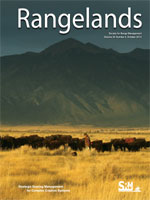On the Ground
To condition plant communities for desired event-driven change, plants should not be defoliated during critical periods of their life cycle year after year.
Because animal preferences cause heterogeneous plant use patterns, sufficient time between defoliations is needed for preferred plants to recover sufficiently to maintain themselves and reproduce.
Adequate levels of recovery between defoliations for individual plants generally requires that they go through their rapid growth phase and elongation of the apical meristem, or they may need to set seed, establish desired structure, germinate, and establish seedlings or some other measure of growth/ regrowth, depending on management goals.
Because of the inherent variability of precipitation in most rangeland environments, achieving adequate recovery will require adaptive management that includes variable recovery periods that may be a full growing season or more in some years, depending on weather, level of defoliation, and timing of defoliation.





